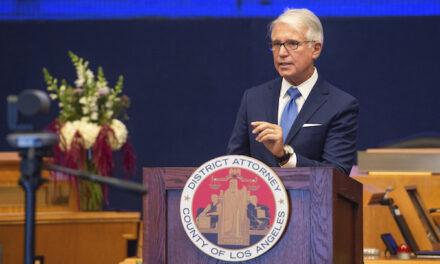LANSING — A justice of the Michigan Supreme Court raised pointed and repeated questions Wednesday about whether the 1945 emergency law relied on by Gov. Gretchen Whitmer was ever intended to deal with a health pandemic.
Justice David Viviano pressed the issue during oral arguments, pointing out that the Emergency Powers of Governor Act was enacted in the wake of a 1943 race riot in Detroit and was referenced in media reports at the time as providing the governor with the police powers needed to respond to such events without having to declare martial law.
Viviano also said that the emergency powers governors are using in most other states to address the coronavirus pandemic are public health statutes, and Michigan has similar provisions in its public health code to address pandemics, which have existed for a century or longer. In fact, he said some of those orders have been issued during the coronavirus pandemic by the director of the Department of Health and Human Services, though those orders appear redundant to emergency orders issues by Whitmer.
“Do you think the Legislature was smart enough in 1945 to know what an epidemic was?” Viviano, an appointee of former Republican Gov. Rick Snyder, asked Deputy Solicitor General Eric Restuccia, representing the governor’s office.
Restuccia pushed back, saying that although the Emergency Powers of Governor Act does not specifically mention epidemics, it says it can be invoked when “public safety is imperiled” and it references disasters and catastrophes that would clearly include major threats to public health.
Wednesday’s oral arguments arose from two “certified questions” a federal judge sent the Michigan Supreme Court in June.
U.S. District Judge Paul Maloney is hearing a lawsuit brought by western Michigan medical providers over a Whitmer order that halted “non-essential” medical procedures. Those orders have since been rescinded, but the case continues.
Maloney asked the court to answer:
Whether, under the Emergency Powers of Governor Act of 1945 or the Emergency Management Act of 1976, Whitmer had the authority to issue or renew executive orders related to the pandemic after April 30, when the Legislature refused to grant a 28-day extension of Michigan’s state of emergency. Whether either the 1945 emergency statute or the one from 1976 violates constitutional law related to the separation of powers between Michigan’s executive and legislative branches of government, by ceding too much legislative power to the governor.
The court could still opt not to answer the questions. Restuccia has urged the court not to answer the questions, saying they are now moot.
The Republican-controlled Legislature has also sued, alleging that the 1945 law, and/or Whitmer’s use of it, is unconstitutional. The House and Senate argue that Whitmer, a Democrat, can only extend an emergency beyond 28 days with the approval of the Legislature, as set out in the Emergency Management Act.
The suit brought by the Legislature is still pending before the Michigan Supreme Court.
Michigan Court of Claims Judge Cynthia Stephens ruled in May that Michigan’s current state of emergency related to COVID-19 is lawful under the Emergency Powers of Governor Act of 1945, which sets out no time limit for an emergency or any requirements for approval from the Legislature. But she said Whitmer could not continue an emergency under the Emergency Management Act for more than 28 days, without legislative approval.
In August, the Michigan Court of Appeals upheld that decision in a 2-1 ruling.
The Legislature argued the governor does not have the power to declare a statewide emergency of indefinite duration, and that if the Emergency Powers of Governor Act does give Whitmer that authority it amounts to an unconstitutional ceding of legislative power to the executive branch.
The Court of Appeals said the Emergency Powers of Governor Act “does not provide any active role for the Legislature during a public emergency, let alone the power to directly act as a check against a governor’s exercise of authority.”
And the opinion noted that when the Legislature passed the Emergency Management Act, decades later, it included wording that said the new legislation in no way abridged or limited the governor’s powers under the 1945 law.
“As for the separation of powers argument, a law is presumed to be constitutional, and courts are obligated to interpret a statute as constitutional unless its unconstitutionality is readily apparent,” the opinion said.
Michigan Supreme Court justices are elected on the nonpartisan section of the state ballot, but they are nominated at party conventions. Republican nominees or appointees hold a 4-3 edge on the court.
Contact Paul Egan: 517-372-8660 or [email protected]. Follow him on Twitter @paulegan4. Read more on Michigan politics and sign up for our elections newsletter.
This article originally appeared on Detroit Free Press: Michigan Supreme Court justice pushes back on Whitmer’s emergency powers
___
(c)2020 the Detroit Free Press
Visit the Detroit Free Press at www.freep.com
Distributed by Tribune Content Agency, LLC.
—-
This content is published through a licensing agreement with Acquire Media using its NewsEdge technology.



















Recent Comments